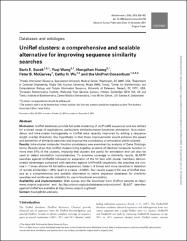| dc.contributor.author | Süzek, Barış Ethem | |
| dc.contributor.author | Wang, Yuqi | |
| dc.contributor.author | Huang, Hongzhan | |
| dc.contributor.author | McGarvey, Peter B. | |
| dc.contributor.author | Wu, Cathy H. | |
| dc.date.accessioned | 2020-11-20T15:06:15Z | |
| dc.date.available | 2020-11-20T15:06:15Z | |
| dc.date.issued | 2015 | |
| dc.identifier.issn | 1367-4803 | |
| dc.identifier.issn | 1460-2059 | |
| dc.identifier.uri | https://doi.org/10.1093/bioinformatics/btu739 | |
| dc.identifier.uri | https://hdl.handle.net/20.500.12809/3110 | |
| dc.description | 0000-0002-1521-4306 | en_US |
| dc.description | WOS: 000352268900017 | en_US |
| dc.description | PubMed ID: 25398609 | en_US |
| dc.description.abstract | Motivation: UniRef databases provide full-scale clustering of UniProtKB sequences and are utilized for a broad range of applications, particularly similarity-based functional annotation. Non-redundancy and intra-cluster homogeneity in UniRef were recently improved by adding a sequence length overlap threshold. Our hypothesis is that these improvements would enhance the speed and sensitivity of similarity searches and improve the consistency of annotation within clusters. Results: Intra-cluster molecular function consistency was examined by analysis of Gene Ontology terms. Results show that UniRef clusters bring together proteins of identical molecular function in more than 97% of the clusters, implying that clusters are useful for annotation and can also be used to detect annotation inconsistencies. To examine coverage in similarity results, BLASTP searches against UniRef50 followed by expansion of the hit lists with cluster members demonstrated advantages compared with searches against UniProtKB sequences; the searches are concise (similar to 7 times shorter hit list before expansion), faster (similar to 6 times) and more sensitive in detection of remote similarities (>96% recall at e-value <0.0001). Our results support the use of UniRef clusters as a comprehensive and scalable alternative to native sequence databases for similarity searches and reinforces its reliability for use in functional annotation. | en_US |
| dc.description.sponsorship | National Institutes of HealthUnited States Department of Health & Human ServicesNational Institutes of Health (NIH) - USA [U41HG006104]; NATIONAL HUMAN GENOME RESEARCH INSTITUTEUnited States Department of Health & Human ServicesNational Institutes of Health (NIH) - USANIH National Human Genome Research Institute (NHGRI) [U41HG007822, U41HG006104, U41HG007822, U41HG007822, U41HG007822, U41HG007822, U41HG006104, U41HG006104, U41HG006104, U41HG006104, U41HG006104, U41HG007822, U41HG006104] Funding Source: NIH RePORTER | en_US |
| dc.description.sponsorship | This project is supported by the UniProt grant U41HG006104 from the National Institutes of Health. | en_US |
| dc.item-language.iso | eng | en_US |
| dc.publisher | Oxford Univ Press | en_US |
| dc.item-rights | info:eu-repo/semantics/openAccess | en_US |
| dc.subject | UniRef clusters | en_US |
| dc.title | UniRef clusters: a comprehensive and scalable alternative for improving sequence similarity searches | en_US |
| dc.item-type | article | en_US |
| dc.contributor.department | MÜ, Mühendislik Fakültesi, Bilgisayar Mühendisliği Bölümü | en_US |
| dc.contributor.institutionauthor | Süzek, Barış Ethem | |
| dc.identifier.doi | 10.1093/bioinformatics/btu739 | |
| dc.identifier.volume | 31 | en_US |
| dc.identifier.issue | 6 | en_US |
| dc.identifier.startpage | 926 | en_US |
| dc.identifier.endpage | 932 | en_US |
| dc.relation.journal | Bioinformatics | en_US |
| dc.relation.publicationcategory | Makale - Uluslararası Hakemli Dergi - Kurum Öğretim Elemanı | en_US |


















